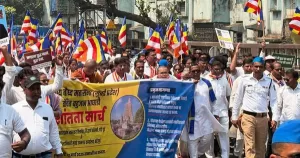Rachakonda Viswanatha Sastri (Raavi Sastri) (30 July 1922 – 10 November 1993), India’s Gorky, was a great Telugu writer whose birth centenary celebrations are presently going on in Telugu states. Reviewing the works of Ravisastri is like doing a social audit, said one judge.
“Raa Vi Sastry gave a powerful narrative on India’s bureaucracy, police, legislature, parliament, apart from the judiciary and the Constitution, understandable even to the common people…We are now debating whether age-old laws dating back to the colonial times, like the Sedition Act, should be scrapped. Raa Vi Sastry made it clear 50-60 years ago that such laws were not needed,” the Chief Justice of India (CJI) N. Venkata Ramana said July 31, in a meeting held in the port city of Visakhapatnam, Raa Vi Sastry’s home town.
CJ Ramana delivered the key note address, and physically attended the birth centenary celebrations of the great Telugu writer and paid glowing tributes.
Returned the Award in 1975 as a mark of protest
He received a Sahitya Akademi Award in the 1960s. Sastry returned it in 1975 as a mark of protest against emergency and his incarceration during that period, though he came out on parole. In 1983, he was honored with the Kalaprapoorna Award by Andhra University. He refused this award.
When he died in 1993, the banner headlines in all dailies were about it, accompanied by copious stories, unique and unprecedented for a writer.
Andhra High Court Judge Justice U. Durgaprasada Rao was the chief guest at the Raavi Sastri Sahitya Samalochana, literary review program held in the morning, while Chief Justice N.V. Ramana was the chief guest at the ‘Vanda Vasantala Ravi’ (100 springs of Raavi) program held in the evening.
Judge U. Durgaprasada Rao said that he thinks that reviewing the works of Raavi Sastri is like doing a social audit. It is said that Raavi Sastri wrote works keeping in mind the welfare of the society. He said that the characters in his works seem to be moving before our eyes. He strongly believes that only Raavi has been able to tell the truth sensitively in works that contain Saaram (content) as well as Saram (sharpness of an arrow).
AP High Court Judges Seshasai, Manvendra Roy, President of the organizers, Visakha Rasajna Vedika, Dr. G. Raghurama Rao were among other dignitaries present. The centenary special Souvenir was unveiled in the morning.
Renowned Telugu writer Olga, who received the Raavi Sastri literature award this year, spoke on the topic of ‘Raavi Sastri’s writings – Emigration regime – Criticism’. She is a leading left feminist writer, a doctorate in literature.
CJI observed, recalling the writings of the great writer: “H.L.A. Hart is known as a great intellectual in jurisprudence. Raavi Sastri is no less in that regard but he did not get due recognition because he was born a Telugu.”
“The (court) judgments should not only reflect the evidences but also the social reality. That way, justice should be done to the people,” Justice Ramana said, quoting from “Aaru Saara Kathalu” (six arrack tales), one of the classic works of Raavi Sastry. “We are now propagating that in English as Raavi Sastri narrated that philosophy in lucid terms, in Telugu, enlacing it to life,” Ramana noted.
Aaru Saara Kathalu describes the contempt with which those who are most vulnerable in a predatory system — the voiceless — are dealt.
Justice Ramana said the works of Raavi Sastri need to be translated into English and Hindi. “I am incapable of doing that. So, if anyone is ready to take up the task, I will bear the entire cost,” he said. He said that he had tried to convey the things said by Raavi Sastri in the conferences held in several other states and abroad, but it was not possible to convey the depth and poignance. Therefore, he said that his writings need to be translated.
“For Raavi Sastri, the common people were the subject of his tales. He narrated the woes of the common people through his writings, reflecting society,” he said adding he was an Ekalavya, an indirect student, of the master writer, who was a lawyer who argued thousands of cases of the oppressed people, free of cost.
Justice Ramana said that even though he was not capable enough to analyze Raavi Sastri’s works, he knew that the Dhisali stood on the side of the poor and fought for their rights. He said that he wondered how a common man could have such writing ability. He reminded the society that the poor are dying because of the Girishas. He was referring to a soft-looking, English-knowing, polished rogue, Girisham, an immortal character of Kanyasulkam, Telugu drama penned by Gurazada (1862-1915) more than a century ago. He used to say directly what he wanted to say through the characters in the works.
Justice Ramana recalled that he was inspired by the writings of Raavi Sastri and other legendary Telugu writers like Gurazada Appa Rao and Sri Sri (Srirangam Srinivasa Rao).
Gurazada’s Desabhakti was a universal lyric for all times which proclaimed: Desamante matti kaadoyi, desamante manushuloyi, meaning: A country is not made of land or soil; a country is made of its people. Highly relevant in these days of chauvinism parading as patriotism. Sri Sri (1910-1983) was a trend-setter in Telugu literature, and the founder-president of Virasam.
Ramana said: It is said that for Raavi sastri Visakha meant extreme love and the local Yarada Hill is considered better than Tirupati Hill. He said that after his retirement (due this August), he will definitely come to Visakhapatnam and organize literary conferences to commemorate the great people who brought fame to the Telugu nation. He suggested that children should be made to read and speak besides speaking and reading in Telugu.
A street play called ‘Tommy.. Tommy.. Tommy’ was performed in the evening. Rachakonda’s brother’s daughter Parvathi reviewed several stories in the morning meeting, attended by a galaxy of writers, scholars and admirers.
It may be recalled that after his death, for days and weeks together, appraisals about him appeared in the newspapers, despite (or because of?) his being uncompromisingly anti-Establishment. Even now, with the centenary, a whole page was devoted by some leading Telugu dailies.
He was likened to Charles Dickens and more to Maxim Gorky, very aptly, with no exaggeration. But to the non-Telugus, he was less if not unknown as there were few translations, as the CJI pointed out.
It is indeed true that his works, bubbling with rich content, deep feelings, varied imagery, native idiom and earthly dialect, are difficult to be captured in foreign languages like English.
Raavi Sastri, a practising lawyer during the Prohibition era (until late 1960s) in Andhra Pradesh, portrayed the judicial system as he saw it — a system stacked up against the poor and the working class. This portrayal is a major theme in Aaru Saara Kathalu (Six arrack tales) published in the daily Visalandhra in 1961, later published in several editions in book form. Sastri’s stories in it were centered on the illegal liquor mafia and trade during this era, and the pitfalls of the judiciary.
Raavi Sastri found the ways of the State and its polity, through its courts, police and offices, to be anti-poor and inimitably critiqued them in his literary work. The police represented the State and its methods of justice. The judicial system was overburdened and insensitive, and the writer’s stories lay bare the many schemes and tricks of unscrupulous people in the system, including the police and the lawyers. He also portrays the relationship between the lives of the poor people who turned to crime and the apathy and indifference of the system, which was at the disposal of the powerful and rich.
Raavi Sastri was born in Srikakulam 1922 July 30 to parents Narayana Murthy and Sitalakshmi. Born a Brahmin (Sastri is a common surname), like majority of the progressive Telugu writers, he identified with and served the most oppressed classes and communities, both as a lawyer and a writer. His home and office were both open to the downtrodden, all his life.
Hailing from Thummapala village in Visakhapatnam district, his father was a lawyer, an initial teacher to him in law, and mother had a literary aptitude.
Sastri graduated with honours to obtain his B.A. from Andhra University, Visakhapatnam. In 1946, he completed his B.L. degree at Madras University. Having gained professional expertise in law by working with Taatha Sriramamurthy, an established senior lawyer, he started his own law practice in 1950.
Ever since 1940s, he observed the lifestyle of the inhabitants of Srikakulam and Vizianagaram, as well as major changes in urban lifestyles at Visakhapatnam. The inhuman conditions people suffered and new ways of urban life with its own underworld caused much distress, and moulded his literature in both content and form. Sastri was among the earliest writers, after Gurajada Apparao and Sripada, to employ native dialects in writing about the effect of these changes.
He began his law career and soon after (1960) he was influenced by Marxist theory.
He was associated with democratic rights movement, part of lawyers who defended adivasis and communist revolutionaries of Srikakulam (1967-72) movement, and was a founder member of Virasam, the Revolutionary Writers’ Association (RWA), of which he was a Vice President for some time . Though not organizationally, he was with the revolutionary movements, and was imprisoned during Emergency (of 1975-77).
Published writings of Raavi Sastri included several novels and more than 60 short stories in six volumes. His was a unique style, and often highly poetic, even while it is very earthly and laced with native idiom and dialect.
Written in 1952, the novel Alpajeevi (the inconsequential being) was an experimental foray into the world of Telugu literature. It was very well received and went on to become one of the most successful Telugu novels.
After the novel Alpajeevi, he wrote two unfinished novels, Raju MahiShi and Rattalu Rambabu. Near the end of his career, he wrote the novel Illu (House).
His writings delved deep into the social fabric of the then-middle class, lower class and upper class society and brought out their contradictions and structural weaknesses plaguing those classes very articulately.
“His long legal stint (since 1948) made him come face to face with advocate crooks, unjust judges, small time criminals, homeless street walkers, cruel police, rotten rich, cunning ‘politicians’ and unseen deities in duty to well known devils,” as summed up by a literary critic.
(M.A. Krishna is a media person. Courtesy: Countercurrents.org.)




